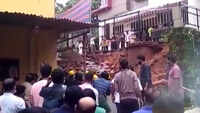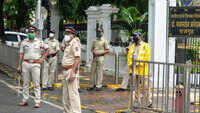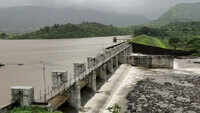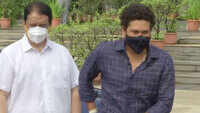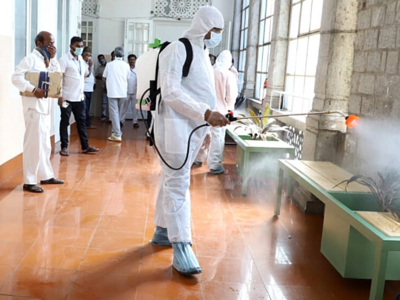
BENGALURU: Ahead of Unlock 1.0 in the second week of June, CM BS Yediyurappa appealed to the Centre to open up Karnataka as the state government was prepared to handle a surge in Covid-19 cases.
“We have enough beds, testing kits. Only thing is we should learn to live with the virus while taking precautions,” the CM said. The state, at that point, had about 3,221cases.
Cut to July: the Covid caseload is 28,877, the state has not allowed any new economic activities to open and is still mulling curbs. In May, there were about 14,000 beds reserved for Covid patients, currently there are 23,896. Still, reports abound about Covid patients being denied hospital beds, tests, even ambulances.
By the third week of June, the state’s much-lauded Covid-management model had unravelled. The government’s complacency and lapses in testing and tracing have led to a crisis, say officials.
“There is a no coordination among ministers... Decisions are being taken in panic and lack clarity. There are over 2 lakh beds in government hospitals. All they need is better management,” said former health minister UT Khader.
‘During lockdown, state should have prepared for the worst’
The state has reported the fastest growth of cases along with Telangana and is now the seventh worst-hit in the country in terms of total cases. Every day in July has added 1,100 cases on average, against about 400 in June. Bengaluru now counts for two out of every five cases in the state.
Officials in the state government say Karnataka has fallen victim to its own complacency, and to a series of lapses — both in governance and in public health management. “When Covid-19 cases were under check during the lockdown, they thought they had won the war. This was the time they should have prepared for the worst by arranging adequate beds, setting up labs and enforcing laws to ensure people maintain social distancing,” said a senior IAS officer.
The state government initially did a good job of ramping up health infrastructure and testing, but it was not good enough for what was to follow. The biggest lapses, say officials, have been in contacttracing and testing.
Top officials and public health experts who are part of the task force said during review meetings, the government repeatedly insisted on strict enforcement of containment zones but on the ground, it translated into a random methodology of checking on some 100 families around the place where the case is.
The ego clashes among senior ministers, lack of coordination between ministers and officials, and a multiplicity of decision-making authorities and power centres in the task force did not help with the state’s response to the pandemic. Amid these turf wars, the government did not involve enough epidemiologists or evolve a model for itself while it was reluctant to follow the Kerala model. “The state government also delayed taking private hospitals on board to fight the pandemic. Only when things started getting out of control did they decide to seek help,” an official said.
As positivity rates kept rising, the state government stopped testing of asymptomatic people, which, experts said, was a blunder. Testing has since failed to keep pace, in turn hampering timely hospitalisation of Covid-19 patients to prevent deaths. “Conducting tests and ensuring people get easy access to treatment is the basic thing the government should have done. But unfortunately, that is not happening. If the situation has turned so bad at just 28,000 cases, then imagine what the state’s plight will be if projections of 1 lakh cases in 1-2 months turn out to be correct,” said a senior doctor.
“We have enough beds, testing kits. Only thing is we should learn to live with the virus while taking precautions,” the CM said. The state, at that point, had about 3,221cases.
Cut to July: the Covid caseload is 28,877, the state has not allowed any new economic activities to open and is still mulling curbs. In May, there were about 14,000 beds reserved for Covid patients, currently there are 23,896. Still, reports abound about Covid patients being denied hospital beds, tests, even ambulances.
By the third week of June, the state’s much-lauded Covid-management model had unravelled. The government’s complacency and lapses in testing and tracing have led to a crisis, say officials.
“There is a no coordination among ministers... Decisions are being taken in panic and lack clarity. There are over 2 lakh beds in government hospitals. All they need is better management,” said former health minister UT Khader.
‘During lockdown, state should have prepared for the worst’
The state has reported the fastest growth of cases along with Telangana and is now the seventh worst-hit in the country in terms of total cases. Every day in July has added 1,100 cases on average, against about 400 in June. Bengaluru now counts for two out of every five cases in the state.
Officials in the state government say Karnataka has fallen victim to its own complacency, and to a series of lapses — both in governance and in public health management. “When Covid-19 cases were under check during the lockdown, they thought they had won the war. This was the time they should have prepared for the worst by arranging adequate beds, setting up labs and enforcing laws to ensure people maintain social distancing,” said a senior IAS officer.
The state government initially did a good job of ramping up health infrastructure and testing, but it was not good enough for what was to follow. The biggest lapses, say officials, have been in contacttracing and testing.
Top officials and public health experts who are part of the task force said during review meetings, the government repeatedly insisted on strict enforcement of containment zones but on the ground, it translated into a random methodology of checking on some 100 families around the place where the case is.
The ego clashes among senior ministers, lack of coordination between ministers and officials, and a multiplicity of decision-making authorities and power centres in the task force did not help with the state’s response to the pandemic. Amid these turf wars, the government did not involve enough epidemiologists or evolve a model for itself while it was reluctant to follow the Kerala model. “The state government also delayed taking private hospitals on board to fight the pandemic. Only when things started getting out of control did they decide to seek help,” an official said.
As positivity rates kept rising, the state government stopped testing of asymptomatic people, which, experts said, was a blunder. Testing has since failed to keep pace, in turn hampering timely hospitalisation of Covid-19 patients to prevent deaths. “Conducting tests and ensuring people get easy access to treatment is the basic thing the government should have done. But unfortunately, that is not happening. If the situation has turned so bad at just 28,000 cases, then imagine what the state’s plight will be if projections of 1 lakh cases in 1-2 months turn out to be correct,” said a senior doctor.

Coronavirus outbreak
Trending Topics
LATEST VIDEOS
More from TOI
Navbharat Times
Featured Today in Travel
Get the app

